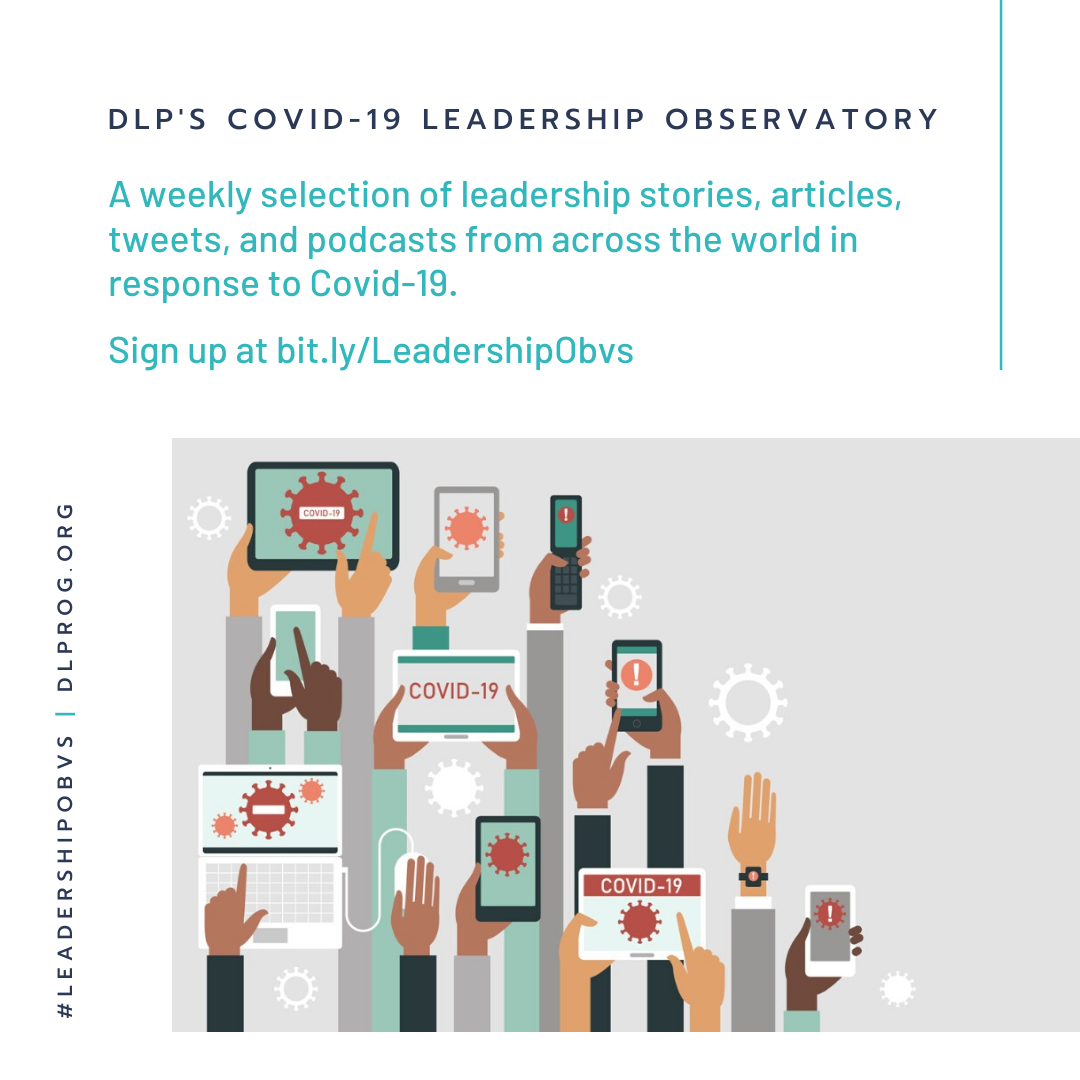During the Covid-19 pandemic, DLP remains committed to supporting leadership, wherever it may be, by helping the flow of knowledge and experience between practitioners, policymakers and researchers. DLP’s weekly #LeadershipObvs collects and summarises all of the leadership focussed resources that we have found most useful for understanding developmental leadership during the crisis – whether they be reports, articles, tweets, videos, podcasts, blogs or other. Covering everything from the challenges of leadership, how to navigate the current conjuncture, how to support processes of leadership, or looking to the future of leadership. Each Observatory is a five-minute read summarising and linking to some of the most helpful work on leadership that week.
Michaela J. Kerrissey and Amy C. Edmondson, ‘What Good Leadership Looks Like During This Pandemic’, Harvard Business Review, 13 April 2020.
This blog outlines four ways leaders can communicate effectively and manage ambiguous threats, in this case, the Covid-19 pandemic. Useful for leaders and advisors in planning for the next phase of coronavirus. Each of the four ways, act with urgency, communicate with transparency, respond productively to missteps, and engage in constant updating are framed by real experience of successful leaders. Leadership is strengthened by continually referring to the big picture as an anchor for meaning, resisting the temptation to compartmentalise or to consider human life in statistics alone. Leaders should become comfortable with receiving criticism after making hard and unpopular decisions, for the benefit of the followership, this includes being willing to feel what it’s like to be in another’s shoes – to lead with empathy.
#LeadershipObvs in a nutshell: Responding to an ambiguous threat takes courage and goes against the natural human tendency to downplay and delay in a crisis.
John R. Allen and Karin von Hippel, ‘Where is The Global Coalition to Fight the Coronavirus?’, Brookings, 16 April 2020.
Coalitions can pool resources, create synergies, generate new opportunities and accelerate outcomes. This blog looks at how countries can work collectively to find a vaccine for Covid-19, often requiring significant leadership commitment from one country to initiate a global coalition. Despite the zero-sum behaviour of so many global leaders during this crisis, scientists from around the world are collaborating at breakneck speed across virtual open borders, sharing vital information to develop vaccines and drugs to treat and ultimately cure this virus. It would be beneficial to humanity — today and tomorrow — if governments could do the same. This leads to a greater need for leaders to rethink global architecture for planning, managing and mitigating complex threats.
#LeadershipObvs in a nutshell: Leaders need to rethink the global architecture required for managing threats collectively.
Amartya Sen, ‘Overcoming a pandemic may look like fighting a war, but the real need is far from that’, The Indian Express, 21 April 2020.
In a time of crisis, governments have a listening role, understanding what the local problems are, where they have hit, and how they affect the victims. This piece looks at the role of government to ensure that the needs of vulnerable groups are not excluded from economic and health support, in this case, India. Tackling a social calamity is not like fighting a war which works best when a leader can use top-down power to order everyone to do what the leader wants — with no need for consultation. During this crisis, a more measured approach is required. Policymakers are encouraged to engage in more in-depth and rapid consultation to create equity in state support.
#LeadershipObvs in a nutshell: Good governance can be significantly helped by informed public discussion, through consultation.
Avivah Wittenberg-Cox, ‘What Do Countries With The Best Coronavirus Responses Have In Common? Women Leaders’, Forbes, 13 April 2020.
Avivah Wittenberg-Cox looks at seven countries with the best responses to coronavirus and identifies they all have women leaders. This piece aimed at the voting public promotes the recognition of strategies such as love, technology, decisiveness, and truth, which are all used by the seven women leaders in Denmark, Finland, Germany, Iceland, New Zealand, Norway, and Taiwan. Using this refined style of leadership has been effective in reducing transmission of Covid-19 and therefore reducing deaths. While each leader used a different approach, research suggests that leaders should avoid imitating male behaviours to gain power and lead with authenticity. These seven national leaders are showing that power is possible in a different way.
#LeadershipObvs in a nutshell: Women leaders are using love, technology, decisiveness, and truth to reduce transmission of Covid-19.
Malka Older, ‘Why Politicians Ignore Disaster Predictions’, Foreign Policy, 13 April 2020
Disasters are often modelled by specialists and planners long before they occur. In this blog, Malka Older looks at why leaders often know what action to take in preparing for disaster, but are unable to act early enough because of restrictions in finance, uncertainty, or at the risk of making unpopular decisions. Older argues that leaders believe a disaster will happen in someone else’s tenure, while also acknowledging that being better prepared for a disaster offers a significant return on investment and saves time when a disaster strikes. Leaders should press ahead with disaster planning early to create a more effective response to a crisis, learning from the current Coivd-19 outbreak.
#LeadershipObvs in a nutshell: Leaders need to take action, listen to specialist advice, and risk unpopular decisions to prepare fully for potential disasters.
Graham Teskey, ‘The Worry of Governance: Coronavirus and Emergency Politics’, Governance and Development Soapbox, 3 April 2020.
Two clear strains of commentary and analysis appear in this blog which looks at state-society relations in a post-Covid-19 world. One theme compares democratic versus authoritarian approaches to leadership, and the other explores the impact of states changing the ‘rules of the game’ and taking on unthinkable powers. Will the state be stronger or weaker following the pandemic? Trust, evidence, state capacity and capability form the core of the debate providing insight into the outcomes we might see following the pandemic. Countries around the world are self-isolating, but in what capacity do they reconnect? The pandemic undoubtedly offers a turning point in global and national affairs and an opportunity for both positive and negative consequences.
#LeadershipObvs in a nutshell: State legitimacy and capacity will determine the outcomes against Covid-19.
Uri Friedman, ‘New Zealand’s Prime Minister May Be the Most Effective Leader on the Planet’, The Atlantic, 19 April 2020
Covid-19 is putting world leaders under the microscope and every leader is judged by their results. Uri Friedman looks at how the actions of Jacinda Arden stand out from others, and why these actions mean that 88% of New Zealanders trust the government to make the right decisions about addressing Covid-19. Arden has implemented policies that have produced real, world-leading results alongside communicating with clarity; on occasions informally on Facebook Live. Often being empathetic to individuals and using the information of trusted health advisors and specialists. We know there is no single correct leadership approach to managing Covid-19. However, leaders should consider how, when, where and what information should be delivered to keep people informed and to provide reassurance that the crisis is being well managed.
#LeadershipObvs in a nutshell: Leading with empathy and standing alongside followers increases support of government decisions.
Matt Andrews, ‘Public Leadership through Crisis 19: How do political leaders commonly structure their roles?’, Building State Capacity, 17 April 2020.
Public leaders need to communicate in a crisis, and how they position themselves alongside advisors, and the rest of the hierarchy is varied. Matt Andrews looks at the structures of centralised control observed during a crisis. The blog explores the reasons why a centralised approach to leadership is not always possible, due to the volume of unknowns, the requirement of citizens and businesses to adapt, mobilisation of many parts of society, or even the most effective approach to adopt. To avoid long-term negative impacts on values, public leaders should seek to choose a leadership style different from ‘command and control’, which is most useful when the crisis conditions are familiar.
#LeadershipObvs in a nutshell: A balance must be struck between centralised decision making processes for efficiency and avoiding compromising on values.
Matt Andrews also appears in the podcast below.
Matt Andrews, ‘Managing Crisis Without Resources: Developing Nations Brace for the Coronavirus’, Harvard Kennedy School, 1 April 2020.
#LeadershipObvs in a nutshell: Leaders should tackle big problems in small component problems, which are easier to grasp and less overwhelming.
Sign up to receive the #LeadershipObvs directly to your inbox
A full list of leadership resources
Other resources are available on Twitter using #LeadershipObvs @DLProg











